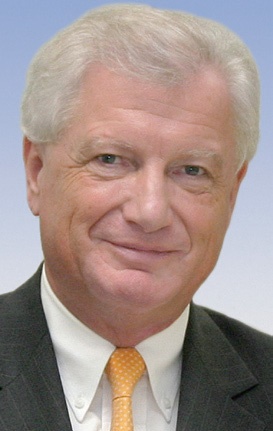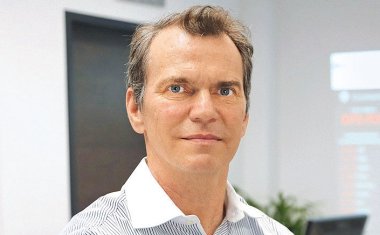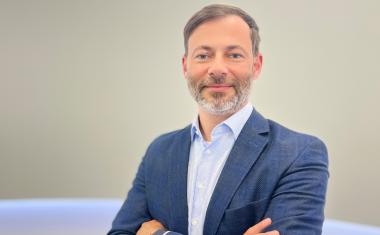GIT-Interview with Volker Zintel about the security at Frankfurt Airport
GIT-Interview with Volker Zintel about the security at Frankfurt Airport. In the air port industry, Britain’s BAA was the first airport operator to follow a network strategy, by lo...

GIT-Interview with Volker Zintel about the security at Frankfurt Airport. In the air port industry, Britain’s BAA was the first airport operator to follow a network strategy, by looking abroad for addition al revenue. Long ago, Fraport AG also started looking beyond Frankfurt and embraced global activities. Today, Fraport is active at European and over seas locations through joint ventures and subsidiaries. Once an exclusive local player at a standalone airport, the Frankfurt Airport company has been transformed into an international airport group (Fraport AG) within only a few short years. Heiner Jerofsky, editorial consultant for GIT SECURITY, author and security advisor had the opportunity to talk to Volker Zintel, General Manager of the strategic business division Airport Security Management of Fraport AG.
You are responsible for Airport Security Management for one of the largest airport groups in the sector, at one of Germany’s biggest airports. What are the fundamental principles behind your work?
V. Zintel: My first principle is certainly that there can be no such thing as one hundred percent security, even though politicians and authorities often attempt to suggest this with the measures which they order. The aim of Airport Security Management must therefore be to keep the potential hazard as low as possible. For this it is important, and this is my second principle, to regularly and critically appraise all aspects of security.
Only tried and tested security systems should be used, because too many regulations and measures obstruct the view of the essentials. Thirdly, I am very much aware that the greatest “security loophole” both now and in the future is, and will be, the human factor. Therefore, especially the “soft” factors of management are considerably important for the quality of security.
Only by means of qualified training, reasonable payment according to the requirements of the job, and a cooperation based on trust can we win motivated, high-performance staff, who will then carry out high quality work. Satisfied employees are the best guarantee for a secure airport.
It is well known that for Fraport AG, security has the very highest priority. How can such an international hub, with such an enormous amount of traffic cater for this requirement in day to day operations?
V. Zintel: In order to successfully perform the daily security tasks of an airport, there must be a good coordination of all security systems at an operative level. This is the responsibility of the Fraport AG security control centre. At an administrative level close and trusting cooperation between the individual security departments and the authorities is essential.
The Airport Security Management is in regular contact with both the State and Federal authorities as well as with the airlines. As well as this, the responsibilities at the airport are very precisely specified by the Aviation Security Act (LuftSiG) which was passed in 2005. According to this, the airport operator is obliged to secure the airport premises. This task is performed by our Airport Security department. Over 350 employees from the Airport Security department and 1,050 employees of FraSec Fraport Security Services GmbH, carry out patrols, traffic checks, personnel and goods checks, as well as providing construction site security, event security and the protection of security and operating areas including the transportation of valuables and other security functions.
In addition to this, the checking of passengers is carried out by the Air Security department. Although according to Article 5, of the Aviation Security Act this task is the responsibility of the Federal State, the air security assistants, i.e. the employees at the security checks carry out this work on behalf of the Federal State. There is also a close cooperation with Fraport Security Services GmbH (FraSec GmbH), the security subsidiary of Fraport AG.
The large airports of the future are far more than simply terminals, air traffic and multistorey car parks. They are airport cities, shopping malls, ICE and bus stations, hotels and highly dynamic urban complexes with a multitude of functions and similarly complex security problems. The local police, customs authorities and Federal police, security service providers and your own security personnel are also at work at the airport. How must one envisage the coordination, delimitation and cooperation of these security bodies?
V. Zintel: Airport Security Management pursues a policy of intensive security partnership with the individual security agencies. This includes regular meetings in which, for example, the individual procedures at the checkpoints are discussed. In addition, other joint cooperation agreements are concluded. Just recently, representatives of Fraport AG, the chief customs office and Lufthansa AG concluded a security cooperation agreement to more effectively combat internal crime and cross-border threats.
The setting up of a national centre of competence for air security between representatives of Fraport AG, state authorities, research institutes and the Lufthansa AG is also a pioneering project, which is intended to coordinate the interests of the project partners in the field of aviation security research in order to concentrate this in the research and development debates of national, European and international committees.
However, cooperation does not mean that individual responsibilities are no longer clearly recognisable. In particular the Aviation Security Act clearly regulates the assignments and responsibilities to be undertaken by particular security agencies. This is the yardstick by which it will be measured.
All security technology must be monitored, maintained and continually adapted to meet the latest standards. The airport security control centre must handle all the CCTV systems, alarm systems, monitoring systems, public address systems and radio traffic around the clock. What are the technical and personnel requirements for operating this nerve centre of the security architecture?
V. Zintel: Without doubt, the security control centre is the main reporting and alarm centre for all security-relevant matters at the airport. This amounts to about 170,000 incidents per year. Described graphically, just like in a nervous system, this is where all the threads of the complex security management system come together. In the case of immediate events, the security control centre coordinates and documents the operative measures of the airport fire, rescue, and airport security services, and ensures the necessary supply of information to all the internal offices and management involved.
As well as this it is responsible for the categorisation of the particular emergency incidents according to an internal operating instruction for emergencies and for alarming the emergency services and bringing them to the site of the emergency. During emergencies it has a supporting role. In August 2007 the security control centre was given a major overhaul costing € 4 million. For the outfitting of the new security control centre, in addition to the use of the latest technology, the clear and user-friendly configuration of all equipment was also a priority.
As a result, all the information required for the assessment of a situation is now available in parallel to all staff on four monitor screens at each workstation. The operation of the systems is convenient and effective thanks to the use of touch screens. In addition, together with the company’s own information and communications service division, the Fraport AG security experts have designed a new emergency control system which is specially tailored to the needs of an international air traffic hub. The new technology is more powerful and offers more operating security, flexibility and capacity. The emergency power supply has also been improved and the existing diesel unit has been supplemented with a modern battery supply. The number of workstations has been increased from eight to ten, in order to cater for the continually increasing number of emergencies.
Fraport AG plans to considerably increase the capacities at the Frankfurt site. The most important measures for this are the expansion of the railway system, the terminals and new maintenance units, as well as the continuous further development of all technical systems to optimise the flow of traffic. What is the state of planning and how do you ensure your security standard during the construction phases?
V. Zintel: Airport Security Management is at the centre of this entire development process. The most important projects have now been launched or will be commenced in the near future. In the near future the fire protection system will be refurbished throughout the airport. Also, Airport Security Management is at present coordinating the security measures associated with the tree-felling work in the Kelsterbach forest. This is the first visible stage of the airport extension.
During all construction activities, a specially set up “extension” command centre and a suboffice of Airport security in the Kelsterbach industrial area are responsible for ensuring security during all construction activities. However, for all the construction sites within the existing premises (some of which are in secure areas) concepts and personnel are also necessary in order to continually monitor people and goods. Furthermore, various project groups are working on the optimisation of security processes.
An example of this is the PAARIS project (Passenger and Resources Information System), with which an optimisation of shift and manning schedules and the control of the deployment of personnel is to be achieved on the basis of a passenger forecast.
Airports are certain to remain sensitive security areas in the future. What are your forecasts for Frankfurt Airport in the light of international crime, increasing mobility and global terrorism?
V. Zintel: By 2020, experts forecast a doubling of the present number of passengers throughout the world. At Frankfurt Airport it is intended that instead of the previous 53.5 million passengers, 80 million passengers will use Frankfurt Airport for their travel. In parallel with this, there will certainly be an increase in competition between the security service providers.
In order to remain competitive, reduction of costs through process optimisation and the introduction of innovative security solutions will play an important role. The large number of passengers and the greatly increased opportunities to misuse new technologies for terrorist purposes require airport operators to produce holistic security concepts.
With its involvement in the FluSs (Airport Security System) Airport Security Management has set the course for the defence against such dangers. This project will combine cutting edge security systems, including from the fields of scanning and sensor technologies for the detection of hazardous substances or locating and navigation technologies in order to form a modern airport security architecture.
On the part of the government, no fundamental innovations are expected in the next few years, although it could be advisable to critically scrutinise the delegation of responsibilities in the German Aviation Security Act in comparison with the established structures of many EU states. At present, it is essential to fully implement the measures which have been resolved up to now. However, this could quickly change in the case of a new terrorist attack.









